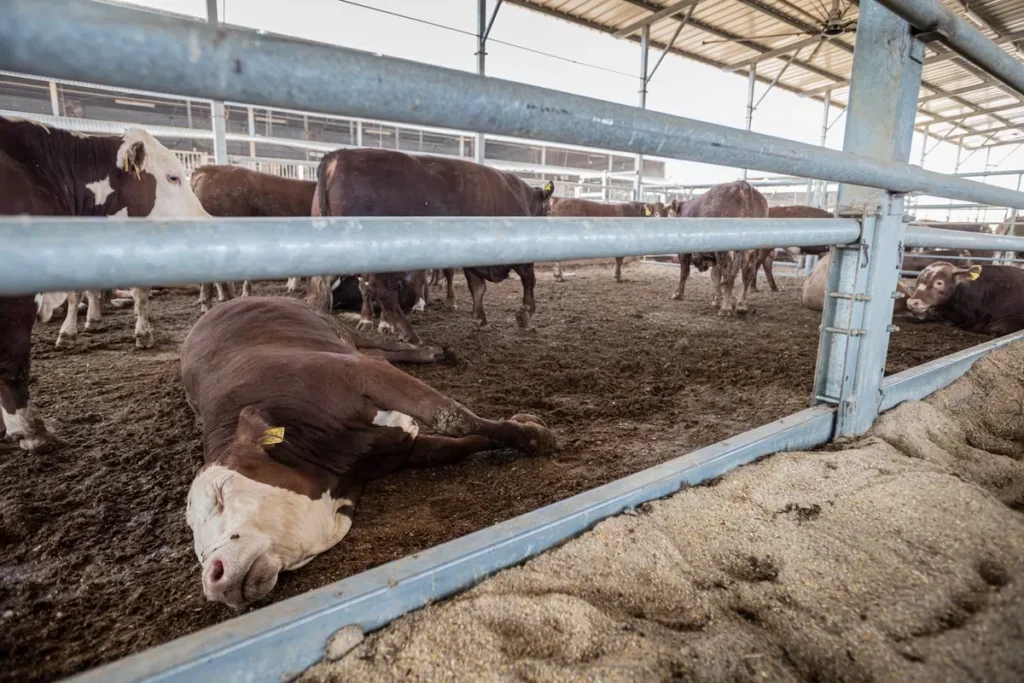WASHINGTON, D.C. – Today, Animal Wellness Action (AWA), the Animal Wellness Foundation (AWF), the Center for a Humane Economy (CHE), and Organization for Competitive Markets (OCM) applauded U.S. Sens. Mike Lee, R-Utah, Cory Booker, D-N.J., Rand Paul, R-Ky., Elizabeth Warren, D-Mass., and Kirsten Gillibrand, D-N.Y., for reintroducing the Opportunities for Fairness in Farming (OFF) Act.
The measure is designed to reform and bring accountability and transparency to reform the USDA’s Commodity Checkoff Programs that have long been plagued by scandal after scandal for misappropriation of funds, lack of transparency, and misusing farmer and rancher tax dollars. Proponents of the OFF Act argue that national livestock trade associations work against the best interests of rank-and-file family farmers and work to benefit the industrial agriculture and international processors. The House companion bill was introduced in June by U.S. Reps. Dina Titus, D-Nev., and Nancy Mace, R-S.C. and is cosponsored by Reps. Steve Cohen, D-Tenn., Tony Cardenas, D-Calif., and Earl Blumenauer, D-Oregon.

“Dozens of checkoff programs impose a cost on farmers, ranchers, and others in exchange for programs that are supposed to benefit contributors. Unfortunately, though foreseeably, obligatory checkoff contributions are often not used in the best interest of all contributors,” said U.S. Senator Mike Lee, R-Utah. “These common-sense reforms will ensure that checkoff funds promote and protect those who choose to contribute.”
“USDA’s runaway checkoff programs must be held accountable, and family farmers have a right to know where their hard-earned tax dollars are being spent,” said Marty Irby, executive director at Animal Wellness Action, and a member of the board of directors at the Organization for Competitive Markets. “The checkoffs remain under fire because of their lack of transparency, misuse of funds, and damaging anti-competitive practices that have bankrupted hundreds of thousands of American farmers and allowed these multi-national operators to forget about the well-being of the animals at the center of their enterprise.”
“Commodity checkoffs have proven time and time again they are illegally using federal tax dollars to lobby Congress in support of policies that hurt family farmers.” said Mike Eby, executive director at the Organization for Competitive Markets. “OCM applauds Sens. Lee, Booker, Paul, Warren, and Gillibrand for reintroducing the OFF that would create a system of checks and balances for oversight, transparency, and accountability in these programs.”
“For too long the checkoff programs have prioritized consolidated markets over independent family farmers, and efficiency over animal welfare and the environment,” said Scott Beckstead, director of campaigns for the Center for A Humane Economy. “The OFF Act will help humane producers and bring long overdue reforms to programs that for too long have done far more harm than good.”
Background:
The OFF Act would amend the authorizing checkoff laws to ensure the programs cannot contract with organizations that engage in lobbying, conflicts of interest, or anticompetitive activities that harm other commodities. It would also require that they publish all budgets and disbursements of funds for the purposes of public inspection and submit to periodic audits by the USDA Inspector General. The measure is supported by more than 250,000 farmers and ranchers across America in an unlikely coalition of allies that include OCM, AWA, AWF, NDPO, the American Grass-fed Association, the National Taxpayers Union, and the National Farmers Union to name a few.
Commodity checkoff programs (“checkoff programs”) were established to serve as mechanisms by which agricultural industries pool money for common commodity-specific promotional and research purposes. Fees are mandatory, from the smallest local farmer to the largest factory operation. Checkoff dollars go to federal, industry-specific boards, which are required by law to use these funds for mutually beneficial advertising campaigns and research.
Under federal law, farmers of certain commodities (including pork, eggs, beef, and corn) are required to pay a portion of their sales into checkoff programs. These mandatory fees are intended to be used by the U.S. government to research and market those commodities. Well-known examples of past checkoff-funded advertising campaigns are “Got Milk,” “Pork. The Other White Meat,” “The Incredible, Edible Egg,” and “Beef. It’s What’s for Dinner.” Checkoff programs collect over $850 million from America’s farmers and ranchers every year. In 2005, the U.S. Supreme Court declared that checkoff activities and speech are those of the federal government.
Despite the limited purpose of the checkoffs, checkoff programs have repeatedly acted beyond the scope of their statutory mandate. Lax oversight by the USDA has resulted in collusive and illegal relationships between checkoff boards and lobbying organizations, both of which have repeatedly used checkoff funds to influence legislation and government action despite a broad statutory prohibition. Such advocacy efforts have an anticompetitive effect and are forcing traditional family farmers to pay into a system that actively works against them.
The OFF Act was first introduced in the 115th Congress by Rep. Titus and former Rep. Dave Brat, R-Virg., in the U.S. House and Sens. Lee and Booker in the U.S. Senate and a 2018 Farm Bill amendment that mirrored the OFF Act was one of only three amendments afforded a vote in the U.S. Senate, but the measure was not included in the final farm bill signed into law.
The full text of the OFF Act can be found here.
Organization for Competitive Markets (OCM) is a membership-based research and advocacy organization working to expose and break the stranglehold of corporate consolidation in our food and agricultural economy. Headquartered in Lincoln, Nebraska, OCM was founded in 1998 by farmers, ranchers, attorneys, agricultural economists, rural sociologists, and state legislators to challenge the growing income power disparities between agricultural producers and agribusinesses in the food system. OCM was founded on the premise that independent farmers and ranchers must ultimately survive and prosper by receiving fair and adequate compensation for their products through the marketplace.


